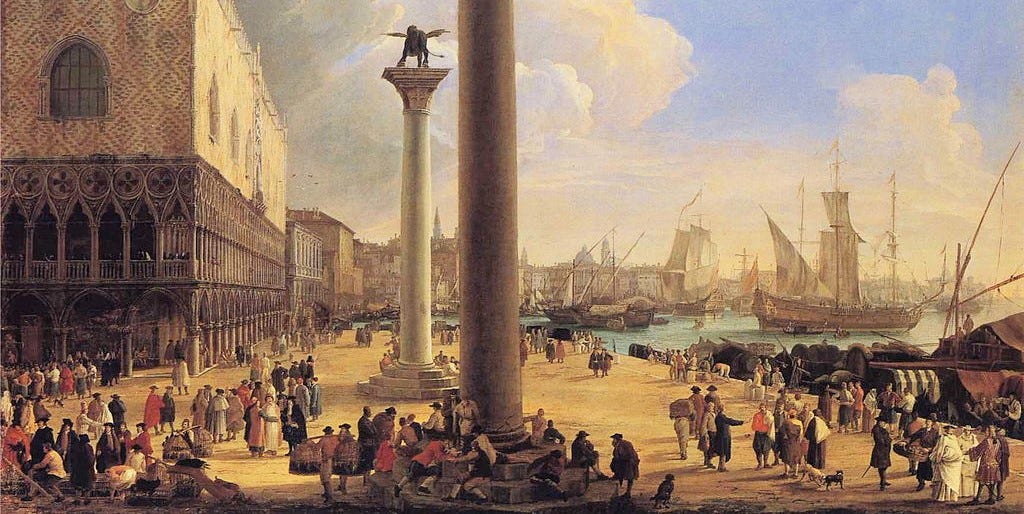A Peek Behind The Veil - Work In Progress
What To Expect Next From Me
Khamal was six years old when Romestro purchased his life with an iron coin plated with gold. So splendid was Romestro’s counterfeit and so venerable looked the buyer that the slave merchants did not even consider testing the coin’s authenticity.
In those days, the slave camps of Albrecht were amply provisioned, overflowing with flesh and fur of all shape and color. Slaves strong enough to stand before the steady stream of buyers did so with eager eyes and outstretched hands. Many of them reached out to old Romestro begging for pity. Some showed their submission by going on all fours, treating him as royalty, shrinking their heads low to the ground. Others flexed swollen arms or discreetly opened their tattered rags to reveal that no touch of the whip would be required for their docile obedience. For they had survived long enough to learn that those who were not purchased by pleasure merchants or the labor-needy would be marched into the stone mines. And it was often said among the people of the Kingdom of Albrecht, after the fall of the Dolanian royal line, that it was better to slave for a master than to serve the pit.
Wrinkled Romestro, shrouded in his dark robes, leaned his ear to the hushed voices of those watching the transaction. Each of them certain that the old man was either a deranged blood magician or a cannibal. He paid them no mind and, taking the purchased child by the hand into one of the darkened alleyways, knelt down and asked the boy his name.
“Slave,” said the child.
Romestro laughed at this, saying that could not possibly be the child’s name. “Slave is not a name. Certainly not yours.”
The child insisted.
Romestro looked deeply into the slave’s eyes. At this, the boy shied away, not caring for whatever he saw in the old man’s gaze.
“No one knows who you are,” said Romestro. “None but me.”
The boy’s timid eyes slid back to the old man, intrigued. “If not slave, who?”
The old man peered down one end of the alley, then the other. “I served your father and your mother,” said Romestro, refusing the boy’s question. “Do you remember them?”
The boy shook his head, his lips bending into a frown.
Romestro placed his gnarled, but not unkind hand on the pudgy round of the boy’s shoulder. “Your name is Khamal of the House of Dolan. I have been searching for you. And though you do not yet understand what that name means or what your life shall become, understand this; I am here to serve and save you. In time, you will repay this service by serving and saving your people.”
Khamal nodded, though Romestro was certain the boy did not understand.
Romestro purchased a horse and cart. He clothed the boy in plain clothes, arming him also with a stiletto dagger, for the streets of the capital had become unsafe since the Dolan housefall. While being feed at an inn, Khamal burned his lips on the first bowl of soup he had ever tasted. Then, he smiled through his quick tears upon hearing a minstrel’s fingers dance upon a lute for the first time. Without permission or apology, newly-named Khamal left the table and stood before the lute’s music and its grinning player. He listened, amazed. Reaching out, Khamal touched the lute, wondering if his fingers could also make such a sound, such magic.
The minstrel, much to the joy of the other patrons, let the astounded boy pluck the strings. Khamal’s eyes and mouth widened, as all children do they first time they birth music into the world. At the ringing of the notes and the giggling of onlookers, Khamal turned to look back at Romestro.
The old man was smiling a victorious smile.
Romestro had a tray of cold meats, hard cheese, and honey bread brought to their room. The boy ate himself into exhaustion. Romestro himself did not eat, but only watched. When the time came for bed, the old man lay on the floor while the child was given the room’s single goose feather matress. Romestro was very old and had grown beyond want of sleep, so he fed the fire with cylinders of wood, bright and hot to ensure the cold never reached beyond the room’s threshold. He watched the boy sleep and dream.
Khamal, in the throws of his dreaming, turned over. Over the boy’s shoulder Romestro saw the little stiletto knife on the bedside table. The old man let out a long sigh and rose. He went to the table and curled his fingers around the hilt. And gently, he turned the little boy so that Khamal lay on his back. The child slept, his chest rising and falling. The old man watched him for a short time, considering.
Romestro opened the boys hand, careful not to wake him, and placed the knife in his little fingers. Reflexively, the hand curled around the scabbard.
“Sleep deeply, my little prince,” said Romestro to dreaming Khamal. “For we have many miles to go, and most all of them to unsafe places.”



